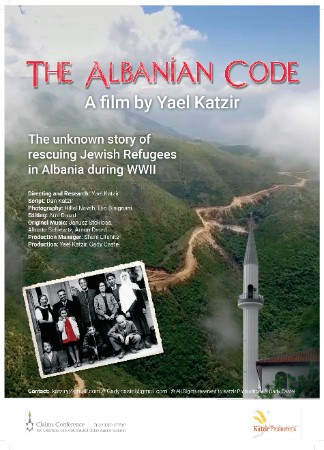
The Albanian Code 2019
Distributed by New Love Films
Produced by Yael Katzir and Gady Castel
Directed by Yael Katzir
Streaming, 55 mins
College - General Adult
European History; Holocaust Survivors; Jewish Studies; Refugees; World War II
Date Entered: 08/26/2020
Reviewed by Dmitrii Sidorov, California State University, Long BeachThis film is an important oral history document related to Annie Frances-Altaratz: born in Yugoslavia, Macedonia, she was 6 years old at the beginning of the Holocaust in Europe. The film follows her on her return trip to Albania to find those who rescued her during WWII and might be still alive and includes multiple video testimonials of 22 participants. Students and scholars of Jewish Studies may especially appreciate originality and scope research for the film: credits list 23 names of participants in research, 4 archives and 10 private archives.
The film’s insightful and uncommon perspective on the Holocaust from the edge of Europe culminates in its final message: The International Raoul Wallenberg Foundation decided to bestow upon Albania the honorary title of "A House of Life" as the only country in Europe that saved thousands of Jewish refugees and the Jewish community in WWII. Why Albania, a predominantly Muslim country?
The country was occupied by an ally of Nazi Germany (Italy) that did not send Jews to concentration camps making it a safe haven to thousands of Jewish refugees from all over Europe. Italians who were eventually viewed by the Nazi Germany as defectors were also saved (20,000 altogether) by Albanians.
The way the Albanians saved the Jews was uncommon. Rather than just hiding them as elsewhere in Europe, the Albanians masked the Jews among themselves by giving them their clothes, Albanian names, and treating them members of their families. The film’s title is reference to foundation of such a behavior. The Albanian Moral Code is a sacred tradition compiled in the Kanun’s rigid laws. One of its highest and most important concepts is Besa -- promise, a pledge of honor, the attitude towards the persecuted. Besa means taking care of those in need and being hospitable to every single person. Taking someone in and giving Besa is commitment to keeping them safe at all costs. Once given, it binds even the most distant family members: entire Jewish families were saved by sending them to relatives who were obliged to take them in.
Thus, the film provides insights into the country’s social culture: it is worth learning that the predominantly Muslim Albanians are very tolerant when it comes to religious affiliations. Besa applies to all Albanians - Christians, Muslims, commoners and leaders. Unlike elsewhere in Europe, in Albania the effort to help the Jews was not limited to individuals and included the state and communities. The film makes reference to Xhafer Deva, Minister of Interior (1943-4) who adamantly refused to compile Jewish name-list. Christians and Muslims accepted Jews into their congregations and listed them under Albanian names in order to keep them safe. Tracing locations allows the film to visualize Albania, one of the least known countries in Europe. Geographers may appreciate visuals of the capital Tirana, drone views of Albanian landscapes, and visualization of the Communist-era bunkers (750,000 in total, or 1 for every 3 Albanians). Diversity of the film’s dimensions allows it to be used in different courses.
Awards:
Winner Kosice International Film Festival